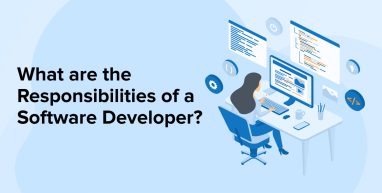
The growth of software development companies is skyrocketing at a pace that is unpredicted in recent years. We see an upsurge in the talent too when it comes to software development services. Unlike a few years back, the scope of software developers was limited to just some of their regular and monotonous tasks. But now if you see, a software developer’s job description includes many responsibilities on their shoulders and so the answer to what the responsibilities of a software developer are sometimes unclear.
Oftentimes, it actually puts the business in a tricky situation wherein they don’t understand what their in-house team of software developers is capable of doing. Therefore, reaping out the best from the talent becomes a tough task. Well, to elaborate on this, we thought of highlighting all the aspects that are required for understanding the role of a software developer.
This blog is focused on a software developer’s job description, roles, responsibilities, qualifications, problem-solving skills, and other essential characteristics, along with the most commonly asked questions. In fact, this blog is for both new developers who want to freshly start a career or even would like to learn and grow, and this will also help software development service providers to reap the benefits for themselves as well as for their company in the long run. So, without much ado, let us get started to understand who is a software developer.
1. Who is a Software Developer?
A software developer is also known as a software programmer, system software engineer, database engineer, web programmer, or even some other job title too which is not mentioned in this list. Being a software developer, there are certain roles and responsibilities that are built around you to execute while you are in the role. Your primary job responsibilities involve building software apps, writing codes, testing codes, altering codes, and fixing several types of errors.
A software developer ought to have a bachelor’s degree in software development and 0-3 years of experience in the industry. They must also have a thorough understanding of standard concepts in their chosen technology, as well as programming practices and procedures. Above all, software engineers must know how to create and execute software development goals using their knowledge, and in case of any problems, they are liable to report them to their respective project managers or leaders. Furthermore, they must be creative and flexible.
2. Job Role of a Software Developer
When it comes to the job description of a Software developer, they have so many languages that can be included as a part of their expertise. If you are a software developer, you must be knowing any coding languages like Java, C#,.Net, C, Sybase, Oracle Software, and some more.
The role of the developer is inclusive of taking charge of developing software by writing code, designing, and implementing new operating systems or modifying software systems or ongoing business projects. Because of technical advancements and the strategic changes of the organization, you as a developer might have to operate continuously in a changing environment. You’ll build, manage, audit, and upgrade systems to meet specific demands frequently with the help of a systems analyst or architect. You might also have to test both hard and software systems to detect and fix system flaws. The roles can differ but these are some of the basics that this job role covers.
A Software Developer works in a team that consists of other developers, UI/UX Designers, System Testers, System Analysts, Business Analysts, and Project Managers to ensure that software projects are completed according to technical specifications and clients’ needs.
3. Software Developer Duties and Responsibilities
When it comes to the job duties of a Software developer, the function might vary from business to business, industry to industry and so will the change in responsibilities. A software developer’s job responsibilities are determined by the needs of the company, organization, or team they work for. Some people design and maintain networks and devices. Others create software after analyzing user requirements that allow users to complete specific tasks on computers, cellphones, and other devices.
Let’s say you’re looking to hire a full-stack developer for your project that can work on both back-ends as well as front-end development. Then the roles and duties will change in accordance with your needs. Let us explore all of the qualities necessary from a common ground or broad perspective in this part.
The most crucial section of the job description is the software developer duties and responsibilities section. Here, one must have a description of the tasks and responsibilities of this position on a daily basis, as well as how the job fits into the organization and to whom the person will report.
- Start with their job role includes they start with examining the initial needs of the users/clients
- Write and test code, make alterations and changes as and when needed, and communicate with any project programmers.
- For new software programmes, they need to investigate, create, and write codes based on different computer operating systems.
- The next thing is to develop current programs by analysing and identifying areas for adjustment or modification by evaluating the software and systems that make computers and hardware operate.
- You need to create technical requirements to integrate current software products and understand the compatible platforms that are set to function together.
- They also have to maintain systems by monitoring and addressing software faults and work together with other personnel, such as project managers, graphic artists, UX designers, other developers, systems analysts, and sales and marketing professionals to produce operational documentation with technical writers.
- Another way, you can also consult clients and coworkers about software system maintenance and performance with the goal of developing or altering existing operating systems.
- Try to look at technology from a newer perspective.
- Utilizing internal knowledge-sharing platforms and external courses, reading manuals, and using new apps are all ways to keep your technical knowledge and abilities up to date.
4. Software Developer Qualifications
Technical education is a must for the job role of a software developer. Also, if you want to get into this technical business, most employers will at least ask for BCA/MCA/ BTech / BE and also there are some companies that run trainee programs that will accept candidates with levels.
Specifically, in a bachelor’s degree, you must have expertise in information technology, computer science, or software engineering that will work well for your CV. It can also be a bachelor’s in Computer Applications BCA as well as a Master’s in computer applications MCA for that matter. The software developer job description will also include the technical knowledge of certain programming languages like Java, C, C++, and others that are necessary for a software engineer to learn.
If you don’t have an IT degree, you might need other software developer skills and you can do that by applying for a graduate trainee program or taking a postgraduate conversion course to improve your CV.
You can apply to transition from one profession to another within software development only. If this describes you, highlight your business and IT experience, and be ready to take some IT-related courses if necessary. For getting into an established firm, you must know and have a certain understanding of the following technologies.
- Java
- .NET
- C++
- Visual Basic
- Linux
- Oracle
- Xamarin
- Flutter
The list goes on with the evolving change in technology. Hence, if you are a professional who wants to grow within the industry, these are some of the technologies that are vital and will bring change to your business/profession. You will benefit from a good training program when you work on different programming languages with different types of business. You also get to showcase your skills and experience to your potential clients.
And with time, you will learn and understand the tactics of software development within a company. Later, you will progress within the company and then become a senior programmer or achieve some senior-level position and understand what more can be performed with these technologies. For progress, you cannot just be dependent on these technologies but there are a few more technical skills as well as analytical skills that are important in making your career journey worthwhile.
5. Top Skills & Proficiencies of a Software Developer
Mastering a set of technical skills and proficiencies is essential for software developers to effectively solve complex challenges and deliver high-quality solutions.
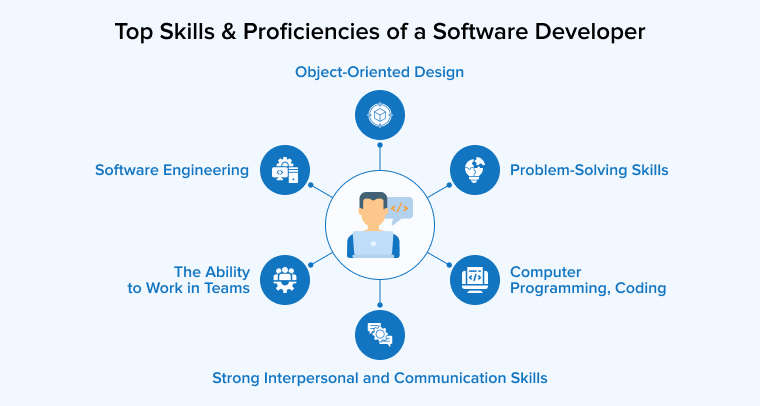
5.1 Technical Skills
In order to start with the list of key technical skills that software developers should have, it’s important to note that each of these skills learned is all set to make a difference. If you are willing to put in the effort then these are some of the technical skills you must know to learn at least of them.
Let’s get to the list.
1. Basic Knowledge of Languages
For some professionals, it inevitably requires some precise technical know-how in such a complex role. We have taken a look at millions of software developer jobs and profiles posted in the last year using real-time job analysis software.
2. IDEs
For any developer, it is necessary to have information about IDEs so as to understand how technical these things work. Visual Studio or Eclipse are critical tools for all programmers to develop C/C++/C# programs.
The project requirements are what sets the tone for an effective IDE in software application development. That is, the optimum value for any application can be derived from the Integrated Development Environment for your project. It can be an IDE that supports the language, plugins, software development timeframe, and app development team you desire.
For each type of development, you would need different IDEs. Like if you are developing an application using C/C++ then you can use Visual studio or eclipse as their tools. IntelliJ IDE is used while working in a Java environment. Likewise, PHPStorm is used for PHP development and LightTable can be used for JavaScript.
3. Algorithms and Data Structure
Again, if you want to grow as a professional, an understanding of algorithms and data structure is a must. Most technology-enabled companies look for it when they hire software developers. Because your problem-solving ability and coding skills are directly related to your grip on using Data Structures and Algorithms efficiently.
If we rewind our clocks, this was not that important for software developers to overlook the importance of Data Structures and Algorithms. However, as your career progresses, you’ll realize how critical it is when you begin to code, you have to remember a lot and memorize the algorithms and functions.
4. Cloud Computing
Any company you work for will, if it hasn’t already, move to the cloud and expect you to be able to use cloud-based applications. Hence, learning and understanding cloud-based applications are very important. Also, when it comes to developers, the team of software developers must be proactive in learning or understanding cloud-based applications. The developers should be skilled enough to write codes on cloud applications, understand its coding and to be able to develop or integrate existing apps for cloud-based platforms. Knowing and having hands-on experience with any of the top cloud platforms, such as Microsoft Azure, AWS-Amazon Web Services, and Google Cloud Platform will give you a significant advantage over the competitors, particularly during interviews.
5. OOP
OOP stands for object-oriented programming language and as a developer, you must master at least one of the programming languages from C, C++, Java, Python, Javascript or anything that is simpler to learn and interests you as a programmer.
6. Computer Network
Understanding the basics of networking is also one of the essential factors for software developers. This interconnection will help your application to grow in different environments.
7. Scripting Languages
Scripting languages make it simpler to create tools and scripts to solve common programming issues. You are free to easily automate the most mundane tasks if you know how to use scripting languages like Python. Python is another programming language that can be used for both OOP and scripting.
5.2 Other Basic Skills
Following are the other basic skills:
1. Interpersonal Skills & Communication
In the non-technical aspect which is not mentioned in the software developer, the job description includes several important aspects other than just development. we would consider communication as one of the primary factors in the skillset. There is a common problem among developers is that they work alone and there is not much space for communication. Even software developers should have a high level of collaboration, team-building leadership quality, and good communication skills.
2. Problem Solver
To successfully steer software development projects to completion, many issues must be identified and resolved quickly. Software engineers must be inquisitive and creative problem solvers, able to sift through code to pinpoint a programming error while also anticipating and adapting to other issues as they arise.
3. Analytical Thinker
The analytic side of the business is equally important for a developer to identify the loopholes if any or even understand the logic or function with which it works. Being good in analytics will help software developers to be smart, logical and efficient to deliver results without delays.
4. Team Work
Software Engineers are typically part of or lead a team, and creating or maintaining great software programs necessitates the input and expertise of many people. That group will share success or failure. Successful software engineers must be able to compromise, motivate others to do their best work, accept and learn from criticism.
6. Education, Training & Certification
For a developer, we have already discussed the type of education that they need and what professional training is necessary for this type of software developers work profile. We must also know what type of certification is required.
From an educational perspective, Software developers usually have a bachelor’s degree in computer science and excellent programming skills. Students who are studying computer science should concentrate on classes that deal with software development. Some employers may prefer candidates who have earned a master’s degree.
Training and certifications are highly recommended because they provide hands-on training and expertise, insight into various industries, and exposure to various programming languages. It’s critical to have a thorough understanding of industry best practices and emerging trends in software development.
6.1 What is Ideally the Future or Career Prospect of a Software Developer?
You know when it comes to the future, you need to understand that there are different levels of software engineering and advancements that are usually based on a combination of skill and experience.
Initially, you start off with junior-level developers while working under the supervision of a leader. They define the scope and objectives, write code, and all other typical tasks for an entry-level position. After three years, you should be capable of writing detailed specifications from which software applications are written and developed with the highest technical level.
Later in your career, you might gain wisdom and knowledge of becoming a senior leader who often takes charge of overseeing the work of a group of developers working on a large project or a number of smaller projects. A minimum of five to seven years of experience is usually required for this. Then comes the senior leadership role like team leadership or project management roles with a technical specialization that leads to higher satisfaction with the roles.
Towards the end of this one, we think we have tried to bring across all the relevant points for new developers as well as businesses who are naive to hiring software developers. We hope to give you all the insights regarding the role of software developers, what all skills are mandatory and which skills can be ignored while still hiring the software developer of your choice. There are a few sets of questions that are quite obvious for a business or a new software developer to have, let us see some of them.
FAQs
What are the basic Interview questions to ask software developers while hiring?
If you are hiring a software developer, there should be a fixed set of questions whose answers should be known to the interviewer. Some of the most obvious questions are;
- Which type of programming languages do they know?
- How do they keep themselves updated with change?
- If they are a front-end developer, do they know about how the backend also functions?
- Can they differentiate between Functional and Object-Oriented Programming?
- Ask them about a Software Development Project they have completed Successfully.
What makes a good Software Developer?
If you are a good software developer, you must have a good understanding of the software development lifecycle as well as databases and algorithms. You should be good at analytics and the problem-solving ability for your building software systems.
What methodologies should a Software developer use?
Nowadays, Agile has been the main methodology we use in our work, though the choice may vary depending on the project. But this follows an iterative approach to project work that allows us to improve product quality on a regular basis while also receiving constant customer feedback.
How to find a good software developer?
There are plenty of options to find a good software developer, you can go through job portals, and freelancing sites, ask for recommendations, and then interview them. So, there are plenty of ways you can hire a software developer as per your unique business requirements.


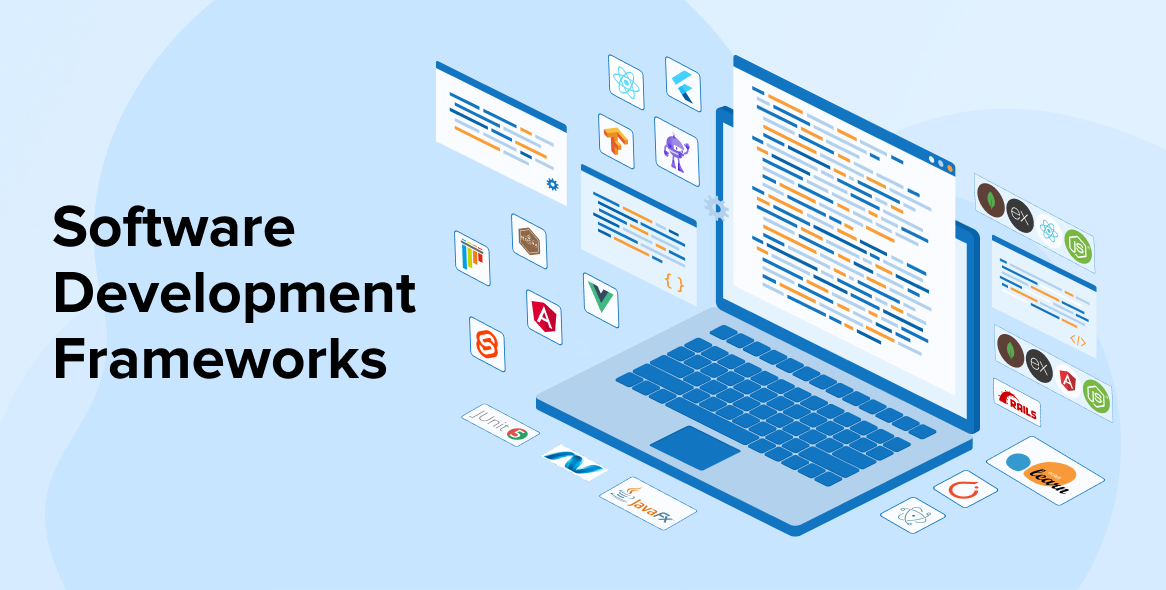
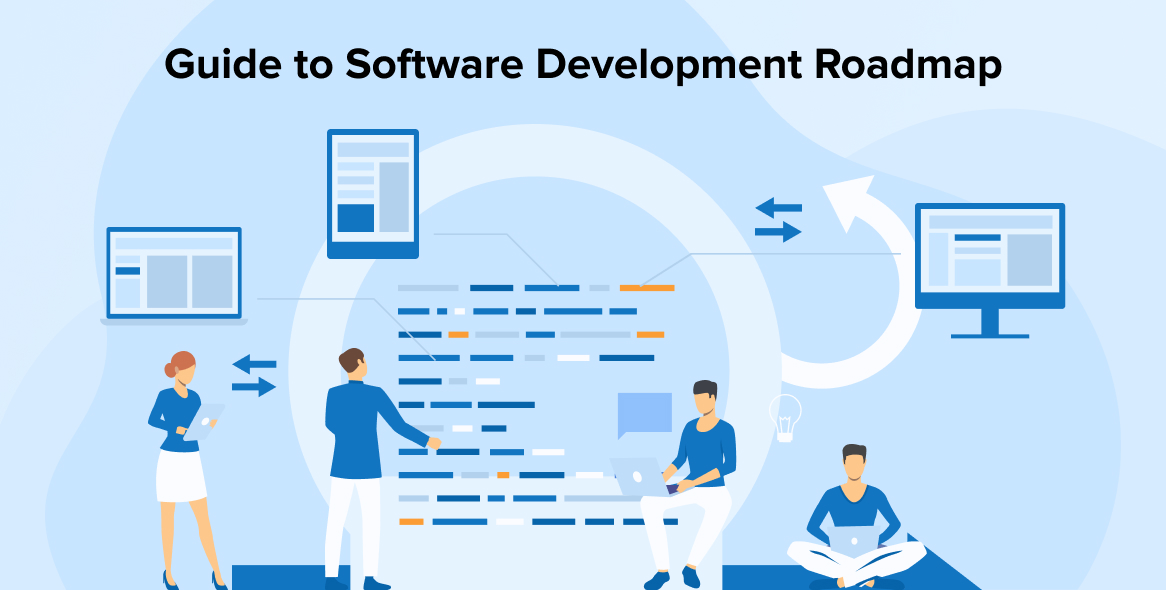
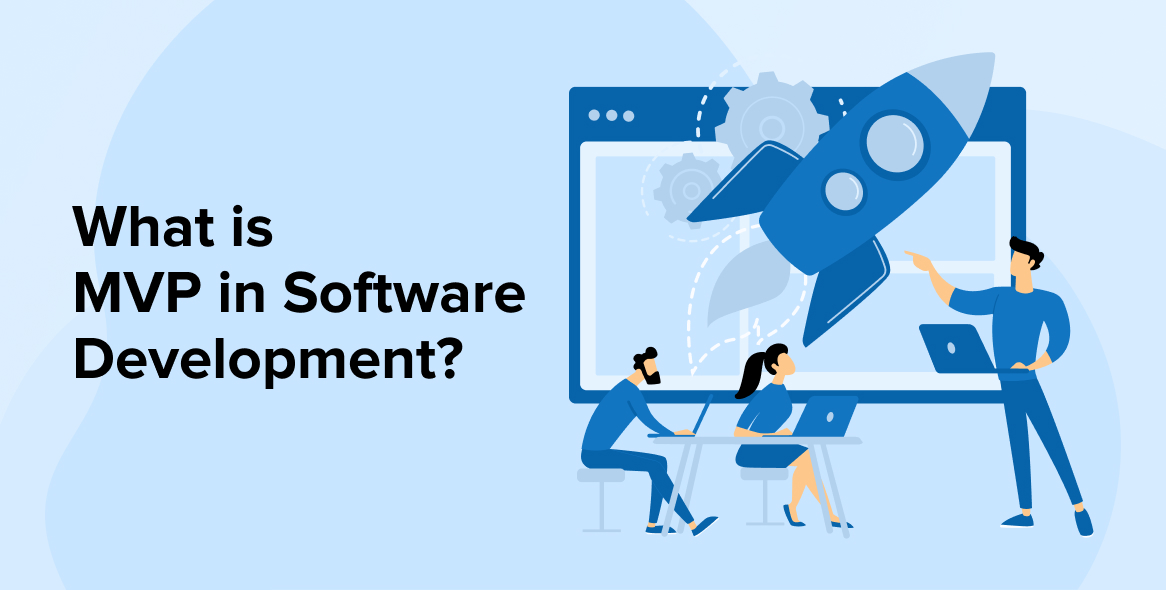

Comments
Leave a message...